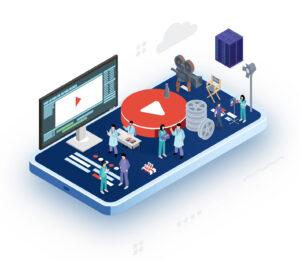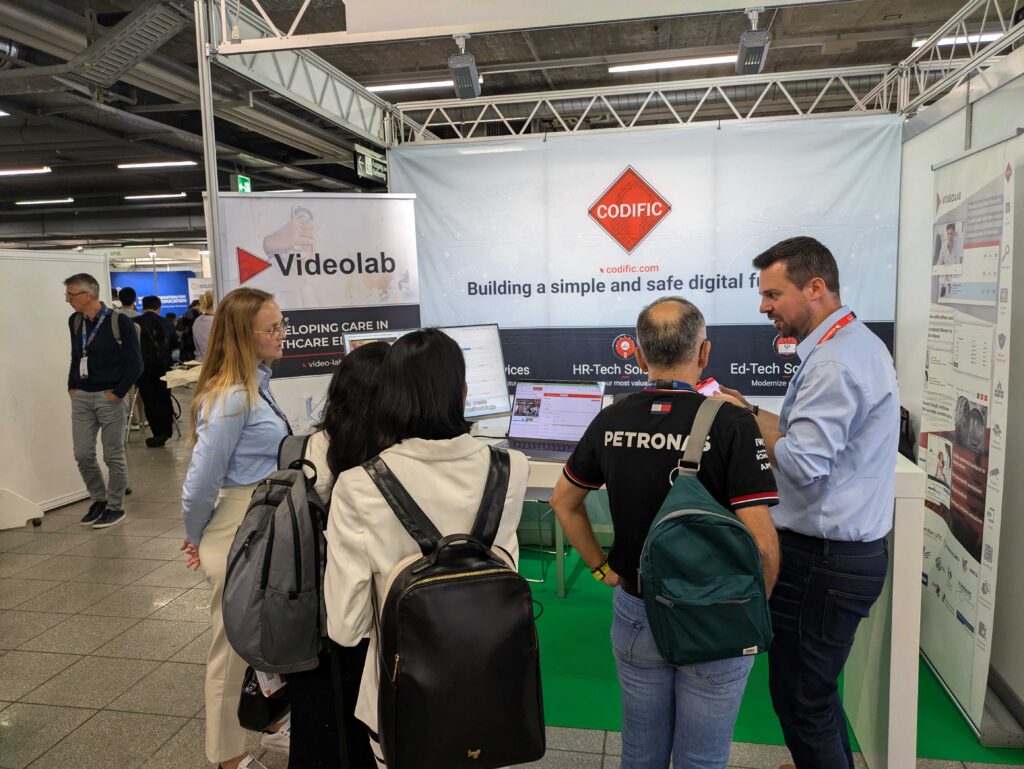At the AMEE conference this year, I had the opportunity to interview several of the respected speakers.
This blog will give a small introduction on each speaker and the main insights taken from each interview. Giving you all the information compact together.
I also interviewed Keynote speaker Jamiu Busari prior to the AMEE conference which you can find here.
Introduction of speakers and their AMEE talks
Interviewee 1 – Chantal Albicher
Chantal is a Programmatic Assessment Master of Medicine AmsterdamUMC-UvA. Previously a gynaecologist, Chantal very much enjoyed the process of learning and the non cognitive parts of education.
Her talk at AMEE was about the power of imagination in the healthcare setting – particularly sketch comedy as a tool in experiential learning.
{YouTube interview linked here}
Interviewee 2 – Jim Campbell
Jim is the Director of the Health Workforce department at the World Health Organisation in Geneva. His work looks at the opportunities around competency based education and how to translate that into practice to ensure that healthcare professionals have the correct skill set to deliver quality care.
Jim’s keynote opening discussion went into questioning whether markets and strategies are aligned between education and equity. He emphasised the need to prioritise access to healthcare, encouraging employers and educators to make this a central focus. The talk explored ways to expand access to medical education as a means to address the shortage of healthcare workers, a growing concern given the increasing demands of our population.
{YouTube interview linked here}
Interviewee 3 – Geoffrey Stetson
As an Associate Professor at the University of Illinois Chicago and the CEO at MedEdMentor, Geoffrey is deeply committed to supporting individuals pursuing careers in medical education. His passion lies in shaping the next generation of educators and helping them navigate this rewarding field.
At MedEdMentor, the mission is to provide access and opportunities for anyone interested in engaging with health professions education. The organisation focuses on making it easier for aspiring educators to enter the field by offering scholarships and resources that remove barriers to participation. Geoffrey’s talk at AMEE aimed to spotlight this new non-profit initiative and its mission to broaden access to health education.
In addition to his work, Geoffrey is also a Director of Clinical Faculty Development, where he teaches clinical educators how to effectively teach in a healthcare setting.
{YouTube interview linked here}
Interviewee 4 – Nino Shiukashvili
Nino serves as the Head of Quality Assurance at Ken Walker University, bringing 15 years of experience as a medical educator and holding a PhD in neuroscience.
In her talk at AMEE, she discussed the curriculum changes they implemented, particularly the redesign of the research component. The new approach requires students, by their 6th year, to conduct independent research, process and analyse their data, and publish their findings. Nino highlighted how these changes have not only enhanced the curriculum but also motivated students to engage more deeply with their academic work.
{YouTube interview linked here}
Interviewee 5 – Elisabeth Schlegel
Elisabeth is an Assistant Dean in medical education at Western Atlantic University and a Professor, Microbiology and Immunology. With a Master of Science and PhD (Genetics and Microbiology/ Education) from the University of Salzburg, Austria.
At AMEE, her talk focused on the concept of micro-assessment in medical education. In fast-paced environments, there is often little time for students to engage deeply with traditional learning frameworks and assessments. Elisabeth’s approach offers a more mindful and intentional way to assess students, integrating learning and evaluation seamlessly into their daily routines.
What are the challenges for people getting into your field and what advice would you give them to overcome these challenges when starting out?
Based on the interviews, the key challenges for newcomers to the medical field include uncertainty, finding the right mentors, and the need for continuous learning. The advice they shared to overcome these challenges revolves around communication, mentorship, and building connections.
Firstly, they emphasised the importance of raising your voice if you’re unsure or have an idea. Whether it’s seeking clarification or sharing a thought, open communication is crucial. Don’t hesitate to ask questions or engage in discussions with peers and mentors.
Secondly, building relationships with people you admire can be a game-changer. Look for professionals whose work you respect and who are in roles you aspire to. Reach out to them, ask questions, and learn from their experience. Many interviewees highlighted how valuable it is to have role models and mentors who can provide guidance and feedback throughout your career, not just in the early stages.
Lastly, if you have a passion for healthcare and education, don’t hesitate to fully commit. Medical education is an incredibly rewarding field, with the power to impact lives and improve health outcomes. Seek feedback, even criticism, and use it as a tool for growth. The professionals I spoke with all stressed that this journey requires dedication, but it’s also one of the most fulfilling paths you can take.
How do you think we can improve the way we teach communication skills?
From the information provided by the interviewees, improving the way we teach communication skills requires a multifaceted approach that combines self reflection, practical tools, and empathy driven frameworks. Here are some of the key insights from some of the interviewees:
-
Teaching doctors how to teach (Geoffrey Stetson):
- Based on his experience in the US, it’s not standard practice to teach doctors how to be effective educators. Geoffrey highlights that while teachers, even at the kindergarten level, undergo rigorous training, observation, and certification, doctors are expected to teach based on their own learning experiences without formal preparation. As the Director of Clinical Faculty Development, Geroffrey emphasises the importance of teaching faculty how to teach, using tools such as video recording to observe and provide feedback.
-
WHO Competency Framework (Jim Campbell):
- At WHO, Jim shared that they created a competency framework outlining six essential areas for healthcare providers, with communication skills being one of them. Within this framework, there are four key activities every healthcare worker must master: communicating effectively, with empathy and across diverse contexts (ages, gender, intensity). Jim believes that embedding communication training with this broader competency framework ensures that every healthcare worker is equipped to handle diverse patient needs, empathising the global importance of communication.
-
The Power of Self-Reflection (Nino Shiukashvili):
- Nino stressed the role of self-reflection in mastering communication skills. While education and external teaching are important, she believes that true growth happens when individuals internalise and reflect on the feedback they receive. Without personal reflection, learning is limited, and improvement is unlikely. Self-reflection, according to Nino, is the foundation for continuous development in communication.
-
Building Trust and Preventing Burnout (Chantal Albicher):
- Chantal pointed out that it’s not only verbal communication training that matters, but also non-verbal cues and other forms of connection. Communication is central to building trust with patients. One challenge she noted is that many students start their careers highly motivated and empathetic, but over time, burnout can lead to mechanical, less empathetic interactions. Teaching communication skills in a way that also addresses long-term emotional resilience is crucial to preserving the empathy and passion that students begin with.
In summary, the healthcare professionals I spoke with believe that improving communication skills training involves a combination of reflective practices, formal teaching for educators, frameworks for competency, and strategies to sustain empathy over the course of a career. These elements together can help healthcare workers communicate more effectively with patients and colleagues alike.

What are your thoughts on the method of recording interactions for practical training and reflective practice?
Recording interactions for practical training is widely seen as a valuable tool, though it can be initially uncomfortable for students. Here’s a summary of their perspectives:
- Valuable tool for improvement (Geoffrey Stetson): Geoffrey mentioned that recording interactions is a powerful tool for self-reflection. Although it can be uncomfortable for students to watch themselves, he believes it is an essential practice for improvement. Geoffrey pointed out that this method is under-used in medical training and could greatly enhance how students develop their communication and interpersonal skills.
- Eye-Opening and helpful (Elisabeth Schlegel): Elisabeth also highlighted that while the idea of being video recording can be intimidating, it is extremely useful. Recording allows students to not only reflect on their own performance but also see how they come across to colleagues. She believes it’s an eye-opening experience that provides unique insights into communication skills.

In conclusion, the interviewees all agree that recording interactions offers students a unique opportunity to reflect on their performance, identify weaknesses, and improve their communication skills. Despite the initial discomfort, they see it as an eye-opening and invaluable tool for personal and professional growth.
